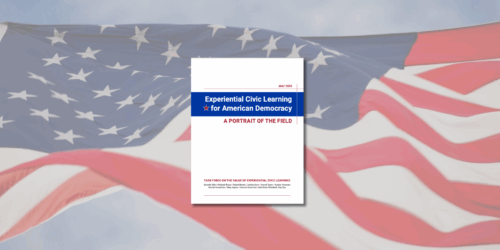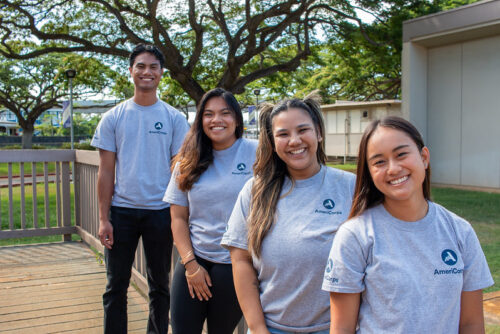At a time when democracy is under strain and young people feel increasingly disconnected from civic life, experiential civic learning offers a powerful way to prepare the next generation for democratic participation. A new report, Experiential Civic Learning for American Democracy fills a major gap in the national effort to improve civic education. Drawing on a first of its kind national landscape analysis of existing civic learning programs, the report offers a clear framework for what experiential civic learning is, why it matters, and how to do it well. The report, from a group of scholars across viewpoint perspectives, makes clear that this field of pedagogy can avoid politicization and should be well-integrated into civic learning offerings. This report will be a fundamental tool in the kit of all educators, policy makers, and scholars seeking to understand the elements of effective practice-based civic learning.
“Citizenship is something we do, not just something we know about; good citizenship is underpinned by strong understanding of fundamental civic knowledge and acquisition of civic habits of mind and heart developed through practice.”
Danielle Allen, Director of the Allen Lab for Democracy Renovation and the Democratic Knowledge Project
“In a time of intense political polarization and social division, we are realizing, or being reminded, that a functional democracy requires us a citizenry with shared civic knowledge and virtues — the kind that make it possible to talk and act together even when we have different political beliefs. Giving young people an opportunity to engage in experiential civic learning is an excellent way to being about this culture shift.”
John Rose, Professor of Practice at the School of Civic Life and Leadership at UNC Chapel Hill
Developed by a broad group of experts—including scholars, practitioners, and educators from across the country who bring a wide range of experiences and perspectives—the report is a companion to the Educating for American Democracy (EAD) Roadmap and its Pedagogy Companion. Together, these reports provide valuable guidance on fundamental aspects of civic education and the addition of Experiential Civic Learning for American Democracy helps answer how to apply these insights to experiential programs.
Report authors: Danielle Allen, Michael Blauw, Robert Burton, Joshua Dunn, Verneé Green, Audrey Heinesen, Rachel Humphries, Mary Jagroo, Hannah Kunzman, John Rose, and Elizabeth Clay Roy
Originally published May 2025.
Danielle Allen is the James Bryant Conant University Professor and Director of the Allen Lab for Democracy Renovation at Harvard University.
Michael Blauw is the Director of Civic Learning and Strategic Partnerships at the Center for Civic Education.
Robert J. Burton is the Tocqueville Assistant Professor of Civic Thought and Leadership within the Department of History and Political Science and director of the Civic Thought and Leadership Initiative (CTLI) within UVU’s Center for Constitutional Studies.
Joshua Dunn is the Executive Director of the Institute of American Civics at the University of Tennessee.
Verneé Green is the Chief Executive Officer of Mikva Challenge, a national leader in the field of youth civic engagement.
Audrey Heinesen is the Vice President of Instruction & Content at Junior Achievement USA.
Rachel Davison Humphries is the Senior Director of Civic Learning Initiatives at the Bill of Rights Institute.
Mary Jagroo is the Manager of the K-12 Program at Girls Scouts of the USA.
Hannah Kunzman is a Ph.D. student in Harvard University’s Government department studying social and political theory and the history of political thought.
John Rose is a professor of practice at the School of Civic Life and Leadership at the University of North Carolina Chapel Hill.
Elizabeth Clay Roy is the Chief Executive Officer of Generation Citizen, a national nonprofit committed to providing youth with the knowledge and skills they need to actively participate in our democracy.
Darshan Goux is the Senior Lab Director for the Allen Lab for Democracy Renovation at the Ash Center.
The views expressed in this article are those of the author(s) alone and do not necessarily represent the positions of the Ash Center or its affiliates.




